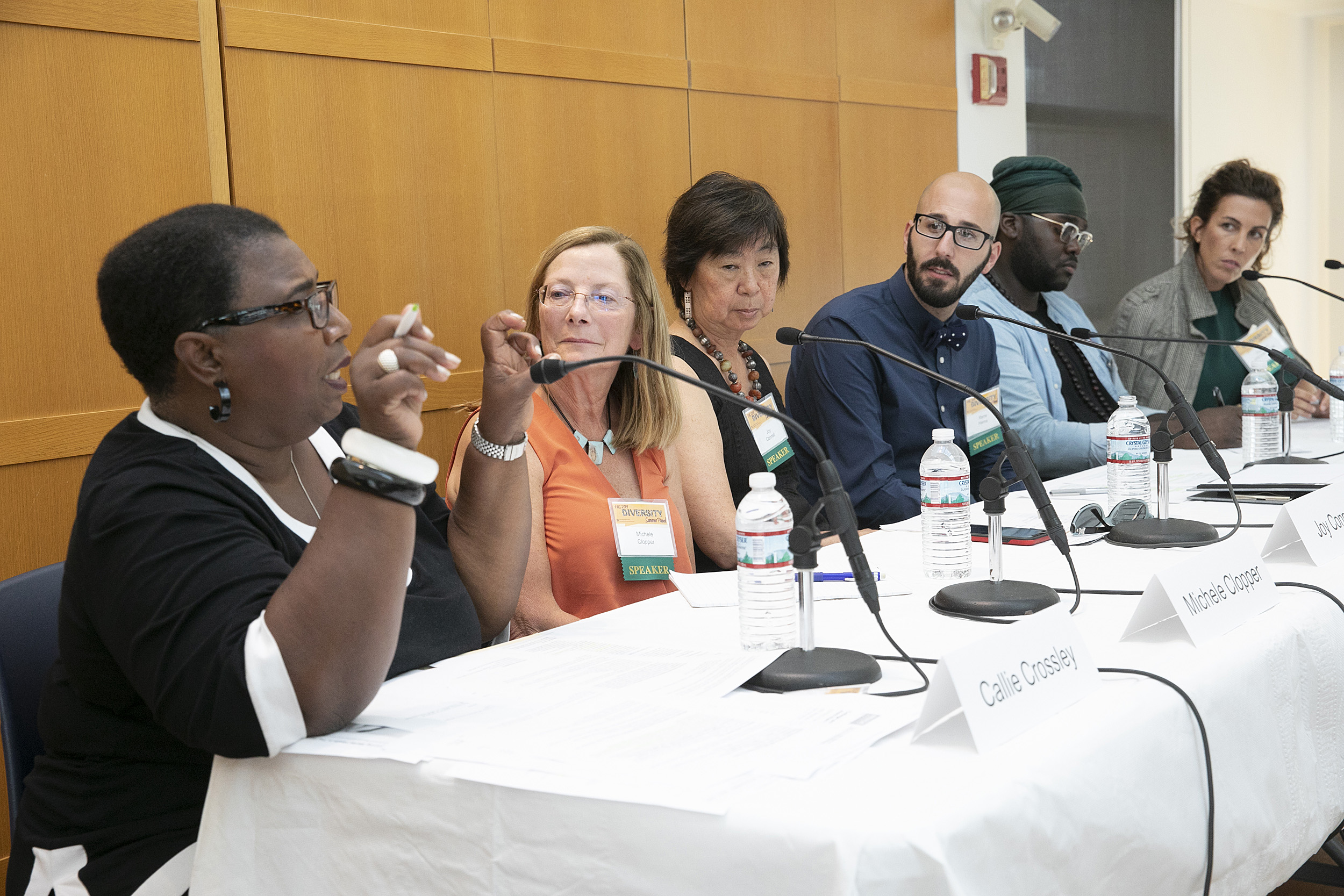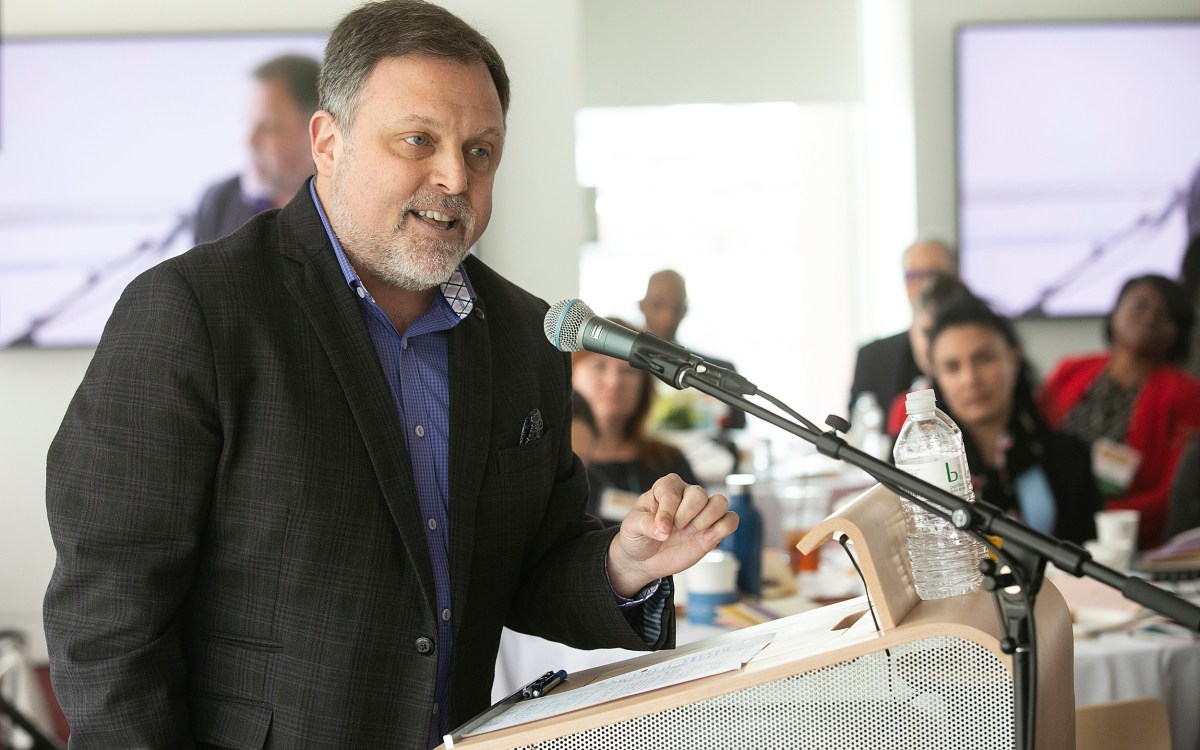
Panel moderator Callie Crossley (left) leads the discussion, “Mental Health as an Invisible Dimension of Diversity,” with a panel of experts at the summer Diversity Dialogue at Harvard Hillel.
Jon Chase/Harvard Staff Photographer
Mental health as a diversity issue
Harvard panelists say disorders are increasingly common, and it’s time to swap stigma for solutions in the nation’s workplaces
It’s about more than race and culture. To embrace diversity is to offer support to communities facing unfair stigmas, and one of the largest and least-discussed in the workplace are the millions struggling with mental health problems.
Experts who served on this year’s Faculty of Arts and Sciences Diversity Summer Panel think it’s time for a change.
“It’s something that affects everyone and it is here with us, among us,” said Andrea Kelton-Harris, senior human resources consultant for FAS, in her opening address at Robert M. Barren Hall at the Harvard Hillel on Thursday. “If our symptoms are invisible, how does our employer help us with it and be sensitive to them?”
Co-sponsored by the FAS Dean’s Office, FAS Human Resources, and the FAS Office of Diversity Relations and Communications, and a part of the FAS Diversity Dialogue series, “Mental Health as an Invisible Dimension of Diversity” brought together five mental health practitioners from Harvard and Greater Boston to discuss the impacts of the problem in the workplace and what can be done about it.
The conversation comes at a time when 40 million people, an estimated 18 percent of U.S. adults, have an anxiety disorder, the most common emotional malady, and another 16 million, nearly 7 percent of the population, have had at least one major depressive episode in the past year, according to the National Alliance on Mental Health. Add to that the fact that 71 percent of adults report at least one symptom of stress, such as a headache or feeling overwhelmed or anxious, according to the American Psychological Association.
“There’s a lot of reasons people are fearful or hesitant to disclose this,” said Joy Connell, director of office of race, equity, and inclusion at the Massachusetts Department of Mental Health, such as fear of diminished expectations around work performance, fear of pressure to resign, and fear of how disclosure could affect social interactions with colleagues. “We spend so much of our waking time at work at these jobs and to have that happen has got to be awful.”
Moderated by Callie Crossley, host of WGBH’s “Under the Radar,” much of the discussion focused on the stigma associated with mental illness and the need for a cultural shift in how it’s perceived.
Rame Hanna, director of diversity, equity, and inclusion at Harvard Library, agreed. “The stigma is really because most people feel like this mental illness will fully define who a person is. It becomes a monolith to who they are and their identity and that others might not see them as capable or that they could risk their job,” he said.
But Hanna pushed a further, calling for it to be seen in the same way other health concerns are.
“We need to see mental health as important as physical health,” Hanna said. “When someone is visibly injured there is this ‘Oh, you can go talk to a doctor’ or ‘Go see a doctor’ [reaction] and there’s no question or thought or stigma associated, but when it comes to anything associated with mental health it now becomes this thing.”
Panelist agreed that eliminating the stigma needs to start with an organization’s leadership.
“We can’t count on people to disclose — it’s not their job or responsibility. It’s our responsibility to create a culture where we are not shying away from talking about it and creating a space where the safety is there,” said Courtney Joly-Lowdermilk, who manages a mental health program for students at the Boston University Center for Psychiatric Rehabilitation.
Panelists discussed ways of creating those safe spaces, including adding training for managers that teaches them to navigate these issues and provides basic information on rights.
Another large part of the solution is evolving legal and company policies that relate to current thinking on mental health, said Tfawa Haynes, a social worker at Fenway Health. “People can be flexible but [policy] can often be very rigid,” he said. Employers also need to think holistically about their employees’ identities, because mental health compounds with their other identities, including race, ethnicity, gender, sexuality, religion, and socio-economic status.
Michele Clopper, director of Harvard University Disability Resources, said it’s important for managers to think of employee accommodations — like flexible work schedules or mental health days — as giving employees what they need to perform their best, which ultimately benefits both the employee and the company.
Among what gives panelists hope is they see a shift happening on many college campuses, where student mental health is increasingly becoming a priority. In a recent report from the American Council on Education, more than 80 percent of university presidents said it was a top focus. They hope to see that translate to university employees and spread to other industries. It will involve plenty of uncomfortable but necessary conversations, they said.
“It’s never comfortable,” said Joly-Lowdermilk. “It might not ever be comfortable. But it’s real and it’s ours to own. It’s everybody’s responsibility.”







